December 10th: Isaiah 53 & Luke 13:10-35
December 9, 2021

Alastair Roberts
The suffering Servant. Parables of Leaven and Mustard Seed and lament over Jerusalem.
My reflections are searchable by Bible chapter here: https://audio.alastairadversaria.com/explore/.
If you are interested in supporting this project, please consider supporting my work on Patreon (https://www.patreon.com/zugzwanged), using my PayPal account (https://bit.ly/2RLaUcB), or buying books for my research on Amazon (https://www.amazon.co.uk/hz/wishlist/ls/36WVSWCK4X33O?ref_=wl_share).
You can also listen to the audio of these episodes on iTunes: https://itunes.apple.com/gb/podcast/alastairs-adversaria/id1416351035?mt=2.
More From Alastair Roberts
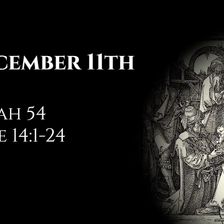
December 11th: Isaiah 54 & Luke 14:1-24
Alastair Roberts
December 10, 2021
Zion restored. The Parable of the Great Banquet.
My reflections are searchable by Bible chapter here: https://audio.alastairadversaria.com/explore/.
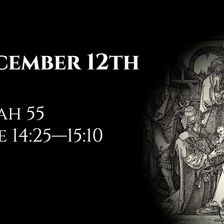
December 12th: Isaiah 55 & Luke 14:25—15:10
Alastair Roberts
December 11, 2021
Come to the waters! The Parables of the Lost Sheep and the Lost Coin.
My reflections are searchable by Bible chapter here: https://audio.alastairadve
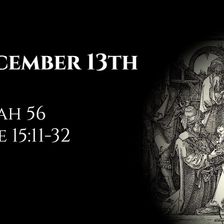
December 13th: Isaiah 56 & Luke 15:11-32
Alastair Roberts
December 12, 2021
The foreigner and eunuch who keep my Sabbath. The Parable of the Lost Son.
My reflections are searchable by Bible chapter here: https://audio.alastai
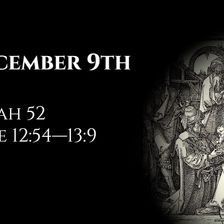
December 9th: Isaiah 52 & Luke 12:54—13:9
Alastair Roberts
December 8, 2021
How beautiful upon the mountains are the feet of him who brings good news. Knowing the times.
My reflections are searchable by Bible chapter here: ht
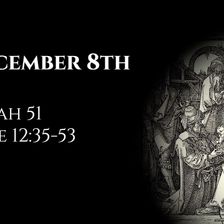
December 8th: Isaiah 51 & Luke 12:35-53
Alastair Roberts
December 7, 2021
The Lord, the comforter of Zion. Being prepared for the coming of the Son of Man.
My reflections are searchable by Bible chapter here: https://audio.
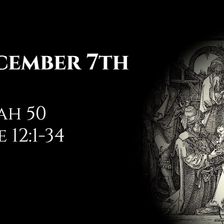
December 7th: Isaiah 50 & Luke 12:1-34
Alastair Roberts
December 6, 2021
The Servant's faithfulness in suffering and confidence in vindication. Jesus teaches the multitude.
My reflections are searchable by Bible chapter h
More on OpenTheo

Is It a Sin to Feel Let Down by God?
#STRask
November 6, 2025
Questions about whether it’s a sin to feel let down by God and whether it would be easier to have a personal relationship with a rock than with a God

Keri Ingraham: School Choice and Education Reform
Knight & Rose Show
January 24, 2026
Wintery Knight and guest host Bonnie welcome Dr. Keri Ingraham to discuss school choice and education reform. They discuss the public school monopoly'

Kingdom Priorities: Following the Teachings of Jesus
Knight & Rose Show
February 14, 2026
Wintery Knight and Desert Rose discuss Jesus' teachings from the Gospels, emphasizing truth, evidence, self-denial, and forgiveness. They explore pass

Why Are So Many Christians Condemning LGB People Just Because of How They Love?
#STRask
January 15, 2026
Questions about Christians condemning LGB people just because of how they love, how God can expect someone to be celibate when others are free to marr

Can Two Logical People Come to Conflicting Conclusions Without Committing a Fallacy?
#STRask
January 8, 2026
Questions about whether two logical people can come to conflicting conclusions on a topic without committing a fallacy, how Greg, as a public figure,

Is It Possible There’s a Being That’s Greater Than God?
#STRask
February 5, 2026
Questions about whether it’s possible there’s a being that’s greater than God and that’s outside of God’s comprehension and omniscience, and how to ex

The Heidelberg Catechism with R. Scott Clark
Life and Books and Everything
November 3, 2025
You may not think you need 1,000 pages on the Heidelberg Catechism, but you do! R. Scott Clark, professor at Westminster Seminary California, has writ

Conservatism and Religious Freedom with John Wilsey
Life and Books and Everything
October 27, 2025
What is conservatism? And why does it go hand in hand with religious freedom? How should we think about the American experiment of ordered liberty? Ha

Why Do We Say Someone Was Saved on a Particular Date If It Was Part of an Eternal Plan?
#STRask
November 24, 2025
Questions about why we say someone was saved on a particular date if it was part of an eternal plan, the Roman Catholic view of the gospel vs. the Bib

When I Can’t Stop Thinking About Something, Is That God Speaking?
#STRask
December 1, 2025
Questions about whether having a recurring thought is an indication God is speaking to you, what to say to someone who says they sinned because “God t

Can You Recommend Good Books with More In-Depth Information and Ideas?
#STRask
January 22, 2026
Questions about good books on Christian apologetics, philosophy, and theology with more in-depth information and ideas, and resources to help an intel

The Making of the American Mind with Matthew Spalding
Life and Books and Everything
February 2, 2026
The United States is unique in how much attention it pays to its founding, its founders, and its founding documents. Arguably, the most famous and mos

What Do You Think About Churches Advertising on Social Media?
#STRask
January 19, 2026
Questions about whether there’s an issue with churches advertising on social media, whether it’s weird if we pray along with a YouTuber, and whether C

What Is Wrong with Wokeness? With Neil Shenvi
Life and Books and Everything
January 19, 2026
In this timely interview, Kevin talks to Neil Shenvi about his new book (co-authored with Pat Sawyer), entitled “Post Woke: Asserting a Biblical Visio

Protestants and Catholics: What’s the Difference? With Chad Van Dixhoorn, Blair Smith, and Mark McDowell
Life and Books and Everything
November 26, 2025
How should Protestants think about the Catholic Mass? About the Eucharist? About the history and development of the papacy? In this panel discussion,
